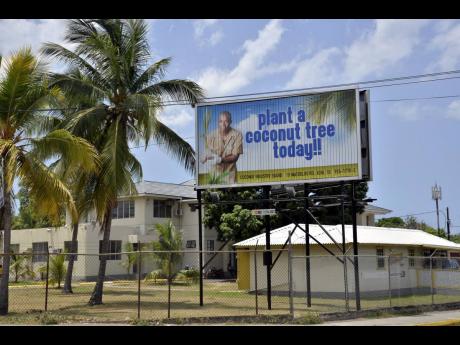COVID-19 blows coconut factory plan off course
A plan for the acquisition of an approximately 1,000-acre property at Water Valley, St Mary, to grow coconuts and do end products processing, has been put on hold by the Coconut Industry Board, CIB, as it completes board changes and its management contemplates the next steps for the commodity board amid the ongoing COVID-19 pandemic. But pandemic or not, the 75-year-old state-owned body has no plans to abandon its $3 billion masterplan for the revitalisation and increased commercialisation of the industry, its administrator has said.
The CIB is a statutory body established by the Coconut Industry Control Act of 1945. It is responsible for monitoring and informing the Government of Jamaica of the state of the coconut industry, advising growers of best practices and providing high quality planting materials to coconut growers.
The CIB had been pushing plans to set up a new seedling garden, nursery and farm on the Water Valley lands and waited for more than two years for approval by the government. The facility was also considered for the establishment of a coconut water-bottling plant and factory for making coconut oil. That was before COVID, coupled with recent dissatisfaction with the potential of the property.
“Basically, we are picking at resources to buy a land which might not turn over anything in the long run. But whether it’s that property or another property, we need to get coconuts on the road to increasing our numbers,” Yvonne Burns, the CIB general manager, told the Financial Gleaner.
Burns didn’t give details about the specific factors that caused the change of mind on the property’s economic potential, but said the search was continuing for an alternative. It is apparent that the general economic downturn brought on by the pandemic, also had a part to play in the about turn.
“We are looking at other properties, but not on the (open) market. It’s being done through other ministries. There are a lot of sugar lands that are not being utilised now, so we are looking to those,” she pointed out.
New board January
A new slate of board of directors for the CIB was expected to be announced earlier this month, but Burns, in providing an update on the board changes, said the new board should be made known to the public in January.
The new board is expected to discuss the issues surrounding the initial plans for Water Valley’s acquisition, but the CIB general manager is not hopeful that any property acquisition will be made by the time the current financial year ends in March of 2021.
Until then, the coconut commodity board is focused on making a head-start on ticking off action items on its 2021 to 2022 operational plan. Among these are the setting up of a 300,000-seedling nursery, clearing 20 acres of lands it has at Esher in St Thomas to plant 2,000 Malayan dwarf variety coconut seedlings, replanting 19 acres of the crop at its Kildare property in Portland, managing the lethal yellowing disease, and distributing 100,000 coconuts seedlings to coconut farmers.
The 2021 plan has been costed at roughly $6 million, with funding to come from CIB resources.
“Wherever we have land we are going to be expanding, that’s for sure and wherever the trees are old and not being productive, we are going to cut them down and replant. We have done about two acres in Kildare already,” Burns said.
CIB has a goal of planting 146,000 acres of coconuts over the next 10 years.
The 2021/2022 operational plan forms part of a larger commercial plan for which the CIB hopes to get approval from the Ministry of Industry, Commerce, Agriculture and Fisheries.
The masterplan proposes several ventures including coconut orchards, a green coconut water packaging plant, production of virgin coconut oil – all aimed at increasing earnings for the industry. The plan, estimated to cost some $3 billion, is expected to be funded through partnerships between the government and the private sector.


